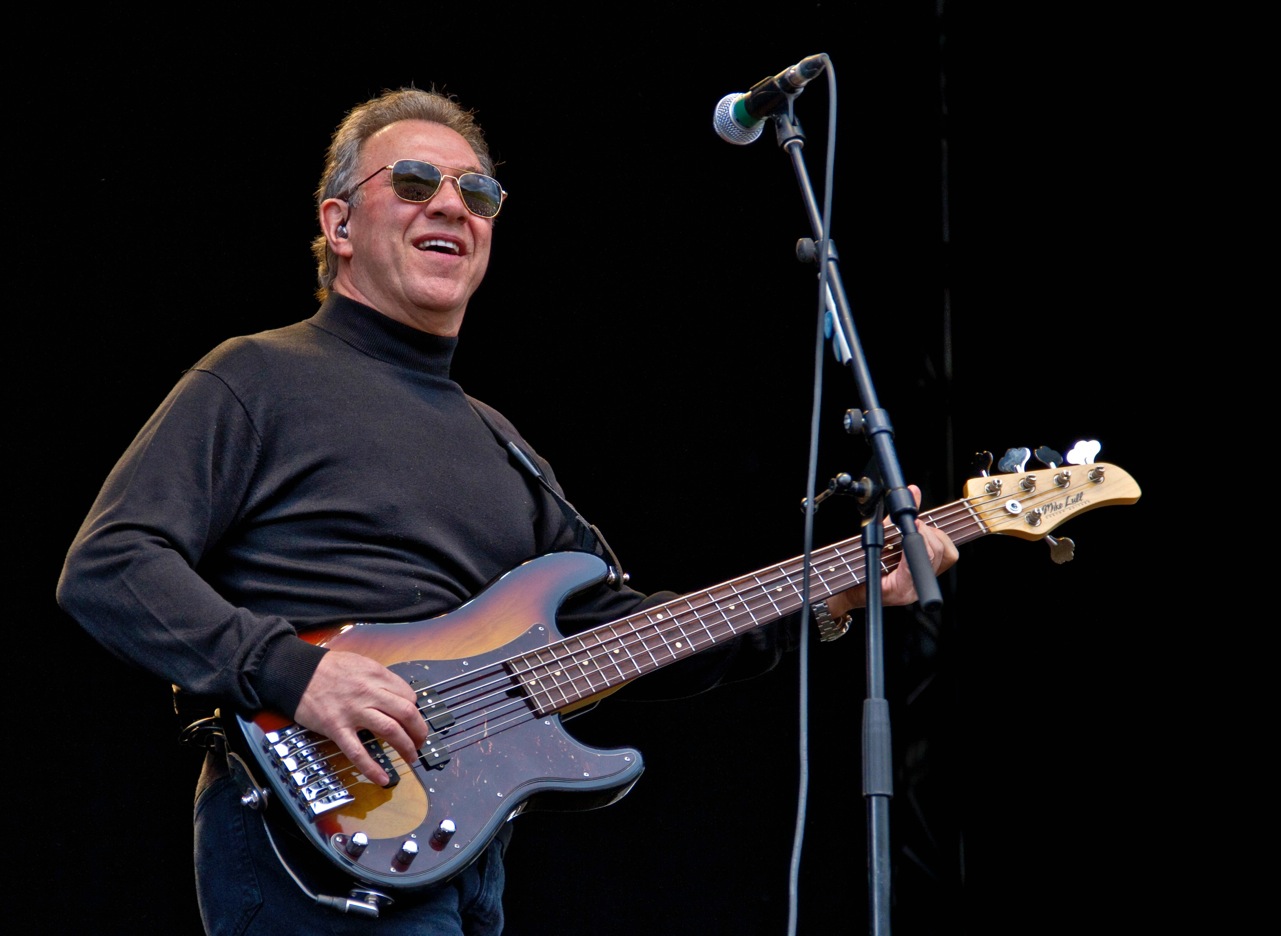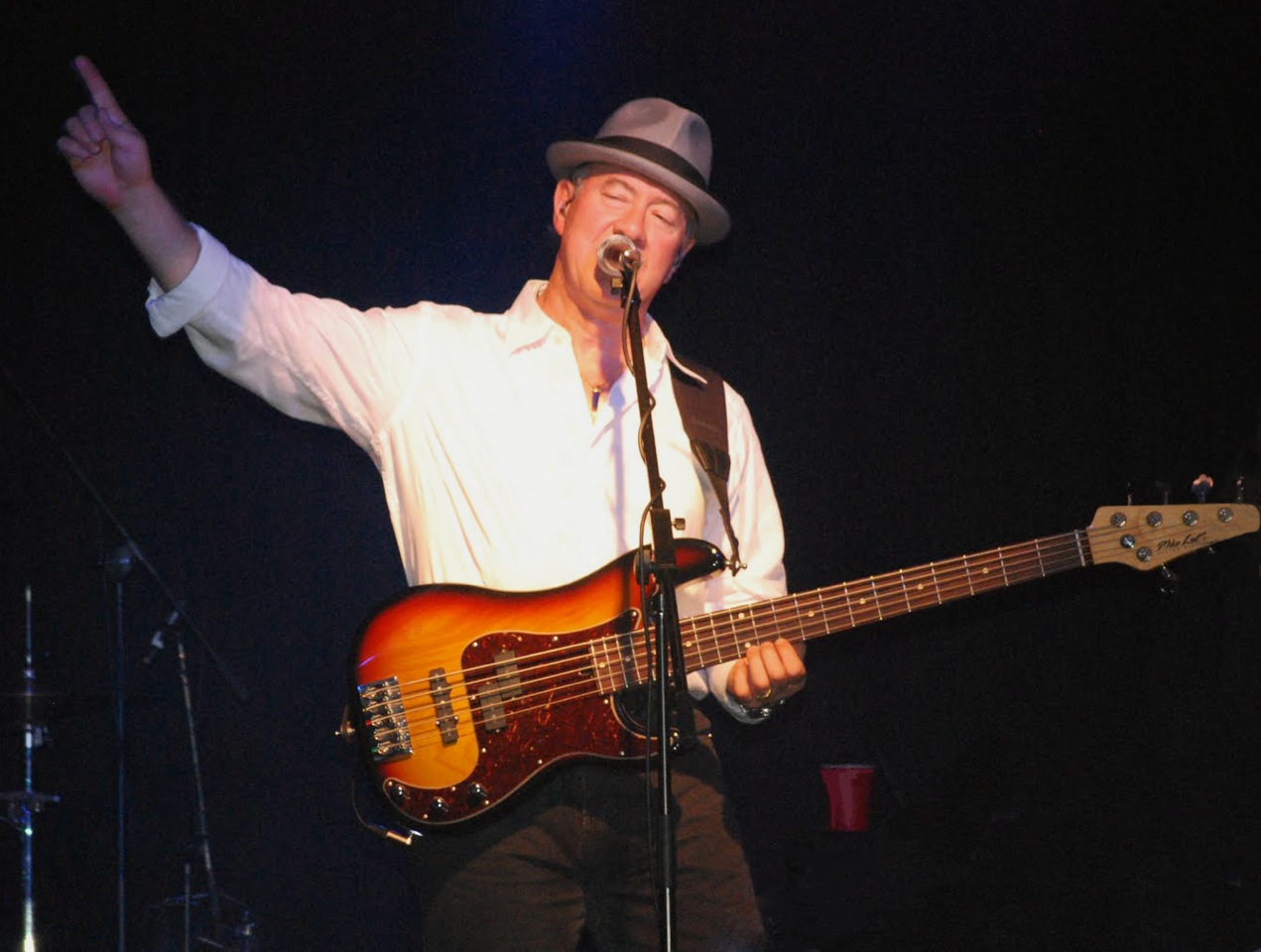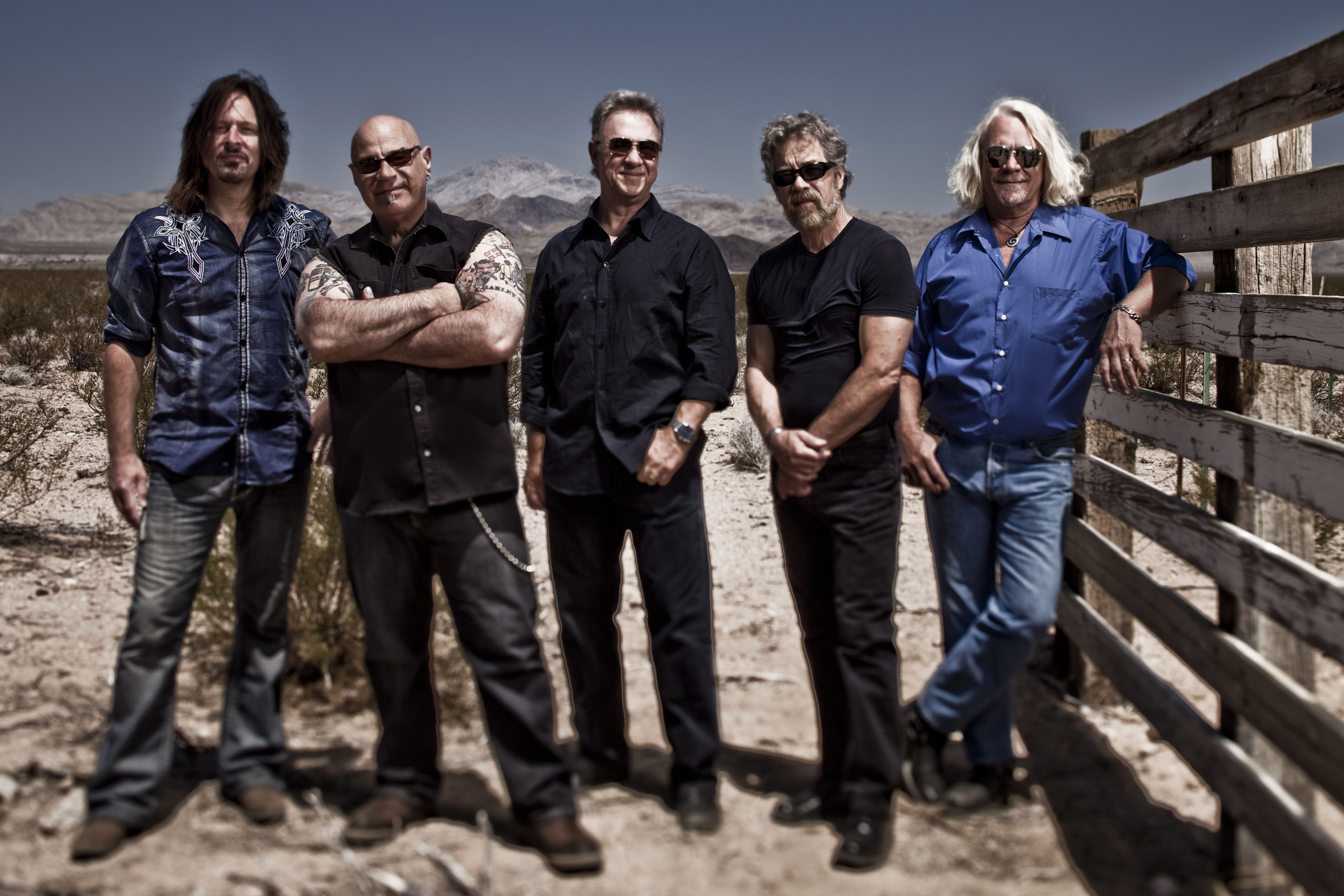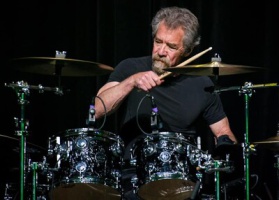Posted July 20, 2014
 Creedence Clearwater Revival is THE American band who has made a permanent mark – strike that – brand (as in branding cattle) on the musical landscape of these United States and even the world. Their songs still enjoy regular, heavy radio airplay and are often featured on movies, commercials and TV programs. Cover bands relish the songs and the first song this wannabe guitar player ever learned was “Proud Mary”. Their music has even been played at a presidential inauguration or two.
Creedence Clearwater Revival is THE American band who has made a permanent mark – strike that – brand (as in branding cattle) on the musical landscape of these United States and even the world. Their songs still enjoy regular, heavy radio airplay and are often featured on movies, commercials and TV programs. Cover bands relish the songs and the first song this wannabe guitar player ever learned was “Proud Mary”. Their music has even been played at a presidential inauguration or two.
How cool is that?
Sadly, the band broke up in the fall of 1972. Each of the band members pursued their own endeavors as either solo artists or working on other projects. Tom Fogerty passed away in September of 1990 after having released five solo albums. The entire band (Tom, posthumously) were inducted into the Rock and Roll Hall of Fame in 1993.
Living in the same small Nevada town of Incline Village, CCR bassist, Stu Cook and drummer Doug “Cosmo” Clifford realized they had too much free time on their hands, so they put together a band to perform a couple of concerts. Thus, the Creedence Clearwater Revisited project was created in 1995 to perform once again the classic Creedence Clearwater Revival hits live. The guys had originally only planned to play private parties but Revisited now performs up to 100 shows a year and released the album “Recollection” – a platinum selling live album of CCR hits. As I told Stu early in our conversation, their music is a gift to mankind that can never be repaid.
Cook said in another interview, “We never really had any intention of playing in public. But a friend wanted to promote a couple of concerts. We got talked into it, but didn’t know how it would go over.” Over the following nearly twenty years, the reaction to Creedence Clearwater Revisited’s concerts has been astounding, and driven in part by a generation of kids who, as Cosmo says, “weren’t even born when the music came out.”
I was recently afforded the opportunity to both catch the band at an Atlanta area concert and to interview Stu Cook by phone the following week. After having the privilege of meeting the band backstage before the show, I smiled as I watched the crowd of about 2,000 strong that consisted of all demographics: male and female, from young to old and from Timexes to Rolexes. The diversity of the crowd reflected those who were either instantly flashing back in time to some great memories of their youth or today’s youth discovering music that is new to them.
The following week, I called Stu Cook at his home as he enjoyed a short break in touring. When I called, I sensed that he was understandably on guard since he’s had to suffer through countless interviews to answer the same questions over and over again. At first, his answers were short and to the point. In time, though, he opened up and we enjoyed a great conversation. The result was one of the most insightful, intriguing and informative interviews I’ve ever had the privilege of conducting.
To give readers a foundational understanding of “Revisited”, I started off by asking Stu what the band is up to these days and what a typical year is like for them.
“Well, every year is different but also similar. We do the same thing every year – that is, as the weather gets warmer, we’re touring more intensely and as the weather cools down, we slow down. The difference is that we’re in different cities. So, it’s the same and it’s different. We play at different venues for different audiences, so while the drill is familiar, there is little else that is the same.We are a performance project so everybody stays healthy and we can get out and do our thing.”
I knew what I had observed of the Atlanta crowd the previous week but I wanted to know what Cook observes as the demographic of the crowds CCR plays to nationally and internationally as a whole.
“Well, it’s loosely divided into thirds. That would be one third (from) each generation since the band came on the scene – the original band, ‘Revival’. So, we’re looking at a third of the people being my age, a third of the people are their kids and a third of the people are their grandkids.”
When I told Cook that is what I had observed, he said, “Well, that confirms it! When we first saw that some twenty years ago, we were a little shocked. We had no idea that we had such a young following.”
As he spoke those words, a question popped into my feeble brain that I hadn’t planned on asking: Did you have any idea as you guys were writing all of those great songs that they would stand as strong as they have?
After taking a few moments to ponder his answer, Stu replied, “They’re good songs, you know? They can’t be faulted for their quality. People have formed their own personal connections with all this music – not just our music but everybody’s music. Once it’s turned over by the artists to the public, who knows what happens? We started out with great songs and the records have an energy that draws people in. The rest? I couldn’t speak to. I never listen to the music. Ha! Ha!”
quality. People have formed their own personal connections with all this music – not just our music but everybody’s music. Once it’s turned over by the artists to the public, who knows what happens? We started out with great songs and the records have an energy that draws people in. The rest? I couldn’t speak to. I never listen to the music. Ha! Ha!”
When I asked Cook what kind of feedback he and the band is getting from crowds these days, regarding what the music has meant to them, he said, “I have a great story for ya! When we were playing some years ago in Europe – the big rock festival in Sweden – the comment was made by someone in our entourage after the concert was over – I’ll paraphrase it – the crowd was leaving and they were all happy and singing and talking exuberantly and the person said, ‘It almost seems like they’ve been to some spiritual event – some kind of Church of Rock and Roll or something – that had lifted them emotionally, if you will, into some kind of really good, high place’. I had never thought about it like that. I guess that is the ultimate goal – the end game – of music is to raise people’s consciousness and their happiness.”
I told Cook that if I had written even one song all those years ago that made people feel that way today, I would feel as if I conquered the world. He responded by saying, “When you see an audience like the one in Atlanta – see how they receive and give back over the course of 90 to 100 minutes of the show – that’s what we get out of it. That’s our satisfaction.”
Woodstock took place 45 years ago this summer and CCR was part of that historic event. Figuratively speaking, while standing on that stage, what did Stu and the band think they and the world would be like 45 years later?
“Of course, we weren’t thinking of any of that! Ha! Ha! We were thinking about will we get electrocuted? Will more of the audio equipment on stage fail before our show is finished? I mean, there were more pressing issues at hand than what would be going on forty five years later but, of course, forty five years later we’re totally amazed at how the Creedence story has been embraced by people all over the world and across the age groups and also across socio-economic groups. There doesn’t seem to be any barriers to becoming a Creedence fan – of any kind, anywhere in the world. We have an audience that is somewhere between the Rolling Stones and Herb Albert and the Tijuana Brass. Eight to eighty is our age group.”
As I mentioned earlier, I met the band before the Atlanta show. I heard the show and was struck by how great the sound of the band is, both musically and vocally. A Boomerocity reader wanted to know something I was thinking about, too, and that was how difficult was it to find such great vocals in the person of John Tristao vocals to replicate original sound of the band?
“Well, you know, we did sort of a networking search pattern – called all of our friends in the music business – both on the business side and on the artists side just to see who they would recommend. I think that we went through, maybe, a half a dozen people – maybe three separate audition cycles with people. When we got to John, he had a tape and some of the stuff on the tape was journeyman readings.
“But the one song that knocked me out was not a real likely Creedence vocal: ‘Looking Out My Back Door’. A country tune. More laid back. Not a screamer. Not a rocker. That one just struck me that he really understood the song. There’s a process that a singer goes through to learn a song and own it. He had done that with that song, for me. I thought it was exactly the reading that was necessary if we were going to make our fans believe that this was a good alternative to the original band.
“Then we met him and he had such a crazy personality – a knock out funny guy! Once he got to know us, he opened up. Then he started owning all the songs! He was, by far, the best choice. The other guys were good but it would’ve taken a lot more work. John thinks like a singer. When he approaches material, he gets inside of it and lets it get inside of him. This is his twentieth year with us. I don’t think he’s missed more than six shows due to illness in all that time. We gotta be pushing two thousand shows by now.”
Whenever I mention to readers and friends about certain bands who are touring with something other than the original line up, I always hear that they’re just not the same without the missing original people in the band. In all the discussions I’ve had about CCR, I can truthfully say that I’ve never heard such complaints or criticisms.
When I mentioned that to Stu, he said, “There are some people who take exception to what we’re doing. It’s amazing to me that anybody would care that much. It’s really about the results. If we weren’t doing a good job, there might be some validity with some of the people who have come after us. Some of them have launched some pretty vicious attacks but we know what we’re doing. We’re together enough that we can judge our own performance. We see how well received we are and have been for many, many years.
But, it’s about the music. It’s not about the line-up. Doug and I are from the original band and we bring with us something that is kind of hard to translate. We’re part of the feel. It feels like and sounds a little like Creedence and then you get a singer who can sing it like people remember it. We’ve got a guitar player and a keyboard player that do their parts and faithfully recreate the idea. We don’t always strive for ‘note-for-note’. We capture the intent, really.
“We have to be able to, as a group – as a unit, we have to be able to pitch that and sell it to the audience. In their minds, it’s not a matter of ‘Should they be allowed to do this?’ Heaven forbid! It’s like you said: How many groups have changed personnel? Practically every one of them! They’ve either added or just outright swapped critical components of their formula or their lineup. I just urge people to close their eyes and have a listen.”
I posed a theoretical question to Cook: You get a call from the President and, based on your years of experience in the music business, he wants to appoint you as Music Business Czar and tasks you with fixing the business. First, do you think there are problems in the business and, if there are, what would you do to fix them?
“There’s definitely a problem in the music business. Simply, I think that the business model has broken for quite some time. That’s because the business failed to get on board early with the internet and that whole transformation in using the internet to sell - to monetize their investment in their intellectual property. They’ve done a very poor job in educating their customers and potential customers as to why it’s important to pay for intellectual property – music, television shows, movies, books – any kind of intellectual property. That’s the growing marketplace for these kinds of transactions. Brick and mortar stuff is having a tough time competing when you’ve got Costco, Wal-Mart and Target, these are not what I would call traditional places people would go to acquire music or books. They all sell – they’re all in competition against the original brick and mortar.
“I think education would’ve been the first place. It’s still not too late. I think that they’re starting to figure out how to show people that there is value and that the whole system depends on people appreciating that there is value and that these works of art don’t just materialize out of thin air. People have to be able to make a living – for obvious reasons – to enable them to continue to create. Let’s just leave the greedy corporation out of it for a second. The actual work of art – the inspiration – came from a human and so if that person can’t get compensated - if piracy is a problem, it’s a problem for everybody, not just corporations. It’s a problem for the creator, as well.
“What has happened over the years – the evolution of this – is there’s been a mixed bag of ‘we’re going to sue them out of existence’, ‘we’re going to give them free things and see if they’re going to come along and pay for it’, on and on and on. So what’s happened, I believe, is that there’s a generation of people who don’t think they need to pay for music or any other kind of entertainment. We’re well down the wrong road here because it’s unsustainable. It takes you back to the 17th and 18th century when artists needed patrons instead of fans, right? Rich people would pay Mozart and Beethoven to compose and to name stuff after them. They would hire an orchestra and rent a hall and they would present it. I’m not sure of the actual concert model back in those days. Ha! Ha! But artists needed patrons in order to live, to eat, to be housed, clothed, take care of their families. I mean, do we want to go back to that? I think the rich people control enough of the world. Do you want them to be the determining musical tastes, as well? I think not! I think it’s up to the consumer to vote with their money – with their wallet as to what is successful and what isn’t. Then you put the corporation back into the picture and you’re going to get a lot of marketing. Regardless, the costs of music because of downloads – although it’s not the same quality as a CD – downloads are sixty percent of the price of a CD.
“So, do you want to support the artists or not? The idea that the record companies are doing this and that and therefore we’re entitled to have it for free is absolute nonsense. To me, it’s a gigantic hole in the ethical landscape. So, yeah, education. The young people have to be educated. I used to save milk money – everybody I knew used to have to save their allowance money or their milk money, their paper route money to go buy music. We didn’t trade files. We had record clubs where we’d pool our money and we’d all decide amongst ourselves which albums we were going to buy and then listen to them together. There wasn’t any copying or sharing other than being in a room or maybe after we all listened to it for a while one of us would take it home and listen to it then give it to the next person like a library book.
“So, the broken model exists on several levels – the price, by taking the distribution out because you don’t have a physical product anymore for the most part – it still exists but the trend is away from CDs, the same as it was for tapes and vinyl. Although, vinyl is coming back some, it’s certainly more of an audiophile thing.“
Then, sounding as though he was literally answering the president’s call, Stu said, “I don’t know .You just have to try a lot of things, Mr. President. First of all, people have to be educated to the fact that, as in the rest of life, there’s no free lunch. You cannot have free music and expect there continue to be people willing to create for free. Mark Twain would’ve probably had something great to say about it. I can only say that they ignored it. They tried to fight it instead of examining it and looking at every possible way to get people back into supporting the artists because that’s what it’s really about.
“The do-it-yourself model is not successful. Very, very, very rarely – very rarely – is there a successful artist who’s done it all by his or herself on the internet. There are some huge ones with YouTube videos and there’s been a couple of huge ones where live performances have driven a large fan base and that . . . can be monetized because they have a large fan base – people who support the artists! That’s what a fan base is. They’re willing to pay for the artists work.
“I don’t know. We’re still in this gigantic, technological changeover. Right now, the music business has probably taken the hardest hit. I think TV and movies are getting a little smarter. They’re looking at the streaming models and subscription models. Once that gets big enough, then the advertisers will start to put back in the revenue that was missing from the physical sale. That’s the idea. If you don’t want to see or hear the ads, you’ll pay a higher subscription rate.”
Showing more passion about this subject that he has obviously given a lot of intelligent thought to, Stu continued by saying, “What’s wrong with that? Now that music is portable – I mean, how much does it cost, really? It’s certainly cheap! So why spend all your time at Pirate Bay or something like that, ripping us off? You really should support the arts. The government doesn’t.”
The legendary bassist continued by saying, “Actually, it’s slowly, slowly improving. When this whole thing first started, the only thing to do was start suing people who downloaded. That was their best solution – the industry’s. You’re just trying to intimidate, bully, scare the people you’re trying to court, ultimately. It didn’t seem like it was going to do anything but they really hadn’t thought about the options. The RIAA pursued these lawsuits on behalf of the record companies, really, not the artists. There was very limited success with any of that stuff.
“I think people need to be educated and enticed away from that sort of behavior. What good does it do to try to criminalize people? You just haven’t made it easy or enticing enough to do it the more honorable or ethical way. Once they see what works and doesn’t work, I think they’ll make some rapid corrections. I know the downturn has stopped and that we have turned the corner. I sure hope so because what’s happened is that it’s made life tough for the artists.
I subscribe to a newsletter called ‘Digital Music News’. It’s a free subscription. It comes out daily and is sponsored by ReverbNation.com and Zoo Labs and so on. They go through and make a lot of reports and bust a lot of myths. They talk a lot about capital raises for all of these music start-ups, executive shuffles, what’s going on, etc. It’s a very interesting take on the new music industry. If you’re at all interested in the health of the business and the way it seems to be going – it’s got a lot of one-step-forward-two-steps-back kind of reporting. Apple buying Beats. Mergers. People looting their start-up companies – getting all of that capital in and then selling all of their stock. It’s a pretty good report on what people are doing in the new music industry.“
One of you readers wanted me to ask Stu if there are any project ideas for new music under a different name that he is pursuing.
“No. Ha! Ha! I’ll flesh that out a little bit. When Doug and I were retired, we put this project together just so we could go out and play and have some fun. Now it’s become a full time job. This is our twentieth year. Twenty years has gone by and I still want to live some other parts of my life. I’ve got a lot of places to go, things to do and I’m really not interested in a music business career. I had one. I just like playin’ and that’s the way Cosmo feels, too. As long as our health holds up – so far, so good/knock on wood – we will continue to play concerts for Creedence fans all around the world. To get back into the meat grinder, it just doesn’t make any sense to me. I don’t want to spend the rest of my life doing that – ANY time of my life doing it! We’ve got a great catalog of songs that we’ve discussed and we all can still play to a pretty high level – if we get enough sleep. So, what the heck! Why make it more complicated? I’d rather vacation. I’d rather travel. I’d rather lay around, go play golf, go for a bike ride – whatever. Go scuba dive.”
 Photo by JeffDowWhat’s on CCR’s radar for the next year? The next five years?
Photo by JeffDowWhat’s on CCR’s radar for the next year? The next five years?
“Just more of the same, you know? We have a team. We have a booking agency. We have a manager. We have our own company team. Once the booking agent and the manager come up with the work that’s routable – where we can get from A to B without too much heroic effort – then we go play the shows. It doesn’t matter to us where they are as long as we can comfortably get there without too much difficulty. That’s this year, which we’re about half way through, and next year. The following year, who knows? It just depends on how everybody feels. At the end of that year, how do we feel about doing it again? If so, we will. If not, we won’t.
“We have the incredible luxury of being able to do whatever we want, right now. We continue to refine our business model. We usually let things come down to this or that. We try to let it be as organic as possible. There’s no over attempt to market this band. It’s largely word of mouth and that’s based on shows like Atlanta. When we really connect with an audience, they share it! Half of our Facebook page fans don’t live in the United States. But we’ve played in most of their countries. We’ve been to Europe. We’ve been to South America many times with the Revisited project. We’ve been to Australia. We’ve played three times in New Zealand! We’ve been to Asia. We’ve been to Central America. We go to Mexico all the time. We have many, many, many foreign fans and they know all about that concert in Atlanta because of that picture that was posted on the Facebook page and they all comment about it. They’re as involved as the people who were there, practically. The whole success of this project is organic based on us doing high level, quality shows. It’s kind of amazing to see something like this. We could’ve marketed it. But we thought that, if this was going to catch on, we’re going to have to do all of the work every night. And we were right. Nothing good comes easy.”
My final question to Stu Cook is one that I ask many of the legends and veterans of the music business and that was: When you’ve stepped off the tour bus for the final time and you go to that great gig in the sky (to swipe a Pink Floyd line), how do you want to be remembered and what do you wish your legacy to be?
“I just wanna be remembered as a regular guy that was fortunate enough to be able to do something he loved and support his family doing it. Try not to hurt anybody. My epitaph? ‘There’s still a lot of meat on the bone, baby! It’s all good!’.”
Keep up with all things Creedence at the following sites:





